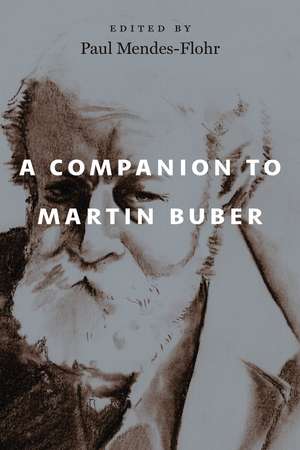A Companion to Martin Buber
Editat de Paul Mendes-Flohren Limba Engleză Paperback – 25 iun 2025
In his 1923 essay, I and Thou, the philosopher, theologian, and activist Martin Buber introduced a philosophy of dialogue that achieved a global, interdisciplinary resonance. For Buber, dialogue was more than a conversation; dialogue discloses something essential about our orientation and our lives with one another. This companion assembles twenty-six scholars from a dozen countries to explore Buber’s international reputation and legacy in education, interfaith relations, Judaism, philosophy, politics, and psychology. The result is an essential guide to one of the most influential Jewish thinkers of the twentieth century.
Preț: 215.81 lei
Nou
Puncte Express: 324
Preț estimativ în valută:
41.30€ • 42.87$ • 34.44£
41.30€ • 42.87$ • 34.44£
Carte nepublicată încă
Doresc să fiu notificat când acest titlu va fi disponibil:
Se trimite...
Preluare comenzi: 021 569.72.76
Specificații
ISBN-13: 9780226838915
ISBN-10: 0226838919
Pagini: 416
Dimensiuni: 152 x 229 mm
Greutate: 0.45 kg
Ediția:First Edition
Editura: University of Chicago Press
Colecția University of Chicago Press
ISBN-10: 0226838919
Pagini: 416
Dimensiuni: 152 x 229 mm
Greutate: 0.45 kg
Ediția:First Edition
Editura: University of Chicago Press
Colecția University of Chicago Press
Notă biografică
Paul Mendes-Flohr was professor emeritus of modern Jewish thought at the Hebrew University of Jerusalem and professor emeritus of Jewish intellectual history at the University of Chicago. He is the author or editor of many books, including A Land of Two Peoples: Martin Buber on Jews and Arabs, also published by the University of Chicago Press.
Cuprins
Prologue: Martin Buber: Philosopher of Dialogue
Paul Mendes-Flohr
Part 1: Philosophy of Dialogue
Introduction
Paul Mendes-Flohr
1 Exodus from Monological Modernity
Christoph Schmidt
2 Martin Buber and Philosophical Anthropology
Asher Biemann
3 “The Between”: Martin Buber’s Transformation of Consciousness
Michael Fishbane
4 Imaging the Imageless, Making Present, and Coming to Light of the Other: Imagination and Buber’s Dialogical Thinking
Elliot R. Wolfson
5 To Hallow the Everyday
Paul Mendes-Flohr
6 Martin Buber’s Ethics of Perception
Sarah Scott
Part 2: Language and Hermeneutics
Introduction
Paul Mendes-Flohr
7 Buber and Language
Joachim Oberst
8 Martin Buber and the Philosophy of Communication
Johan Siebers
9 Buber and Expressionism
Bernhard Lang
10 Buber’s Hermeneutical Biblical Theology
Steven Kepnes
11 Buber’s Relational Ontology and Dialogical Listening
Claudia Welz
Part 3: Psychology and Education
Introduction
Paul Mendes-Flohr
12 Buber’s Concept of the Soul
Cornelia Muth
13 Buber on Solitude
Michal Bizoň
14 Buber on Psychotherapy and Psychoanalysis
Henry Abramovitch
15 Martin Buber: Education toward Humanism
Aslaug Kristiansen
Part 4: Interfaith Dialogue
Introduction
Paul Mendes-Flohr
16 Buber and Christianity
Karl-Josef Kuschel
17 Martin Buber and Eastern Wisdom
Hune Margulies
18 Buber Meeting and Not-Meeting Islam
Khaled Furani
Part 5: Judaism
Introduction
Paul Mendes-Flohr
19 Martin Buber on Israel’s Divine Election
Manuel Duarte de Oliveira
20 Buber and Hasidism
Sam S. B. Shonkoff
21 Buber and the Holocaust
David Barzilai
Part 6: Politics
Introduction
Paul Mendes-Flohr
22 Buber’s Concept of Theopolitics
Samuel Hayim Brody
23 Buber’s Concept of Gemeinschaft (Community)
Inka Sauter
24 The Ethical View of the Palestinian Other
Amal Jamal
25 Feminism and Buber’s Legacy: A Critical Reception
Yemima Hadad
Part 7: Reception
Introduction
Paul Mendes-Flohr
26 Buber in France: From Gaston Bachelard to Emmanuel Levinas
Dominique Bourel
27 Buber’s Philosophy of Dialogue: A Japanese Perspective
Fumio Ono
Glossary
List of Contributors
Index
Paul Mendes-Flohr
Part 1: Philosophy of Dialogue
Introduction
Paul Mendes-Flohr
1 Exodus from Monological Modernity
Christoph Schmidt
2 Martin Buber and Philosophical Anthropology
Asher Biemann
3 “The Between”: Martin Buber’s Transformation of Consciousness
Michael Fishbane
4 Imaging the Imageless, Making Present, and Coming to Light of the Other: Imagination and Buber’s Dialogical Thinking
Elliot R. Wolfson
5 To Hallow the Everyday
Paul Mendes-Flohr
6 Martin Buber’s Ethics of Perception
Sarah Scott
Part 2: Language and Hermeneutics
Introduction
Paul Mendes-Flohr
7 Buber and Language
Joachim Oberst
8 Martin Buber and the Philosophy of Communication
Johan Siebers
9 Buber and Expressionism
Bernhard Lang
10 Buber’s Hermeneutical Biblical Theology
Steven Kepnes
11 Buber’s Relational Ontology and Dialogical Listening
Claudia Welz
Part 3: Psychology and Education
Introduction
Paul Mendes-Flohr
12 Buber’s Concept of the Soul
Cornelia Muth
13 Buber on Solitude
Michal Bizoň
14 Buber on Psychotherapy and Psychoanalysis
Henry Abramovitch
15 Martin Buber: Education toward Humanism
Aslaug Kristiansen
Part 4: Interfaith Dialogue
Introduction
Paul Mendes-Flohr
16 Buber and Christianity
Karl-Josef Kuschel
17 Martin Buber and Eastern Wisdom
Hune Margulies
18 Buber Meeting and Not-Meeting Islam
Khaled Furani
Part 5: Judaism
Introduction
Paul Mendes-Flohr
19 Martin Buber on Israel’s Divine Election
Manuel Duarte de Oliveira
20 Buber and Hasidism
Sam S. B. Shonkoff
21 Buber and the Holocaust
David Barzilai
Part 6: Politics
Introduction
Paul Mendes-Flohr
22 Buber’s Concept of Theopolitics
Samuel Hayim Brody
23 Buber’s Concept of Gemeinschaft (Community)
Inka Sauter
24 The Ethical View of the Palestinian Other
Amal Jamal
25 Feminism and Buber’s Legacy: A Critical Reception
Yemima Hadad
Part 7: Reception
Introduction
Paul Mendes-Flohr
26 Buber in France: From Gaston Bachelard to Emmanuel Levinas
Dominique Bourel
27 Buber’s Philosophy of Dialogue: A Japanese Perspective
Fumio Ono
Glossary
List of Contributors
Index
